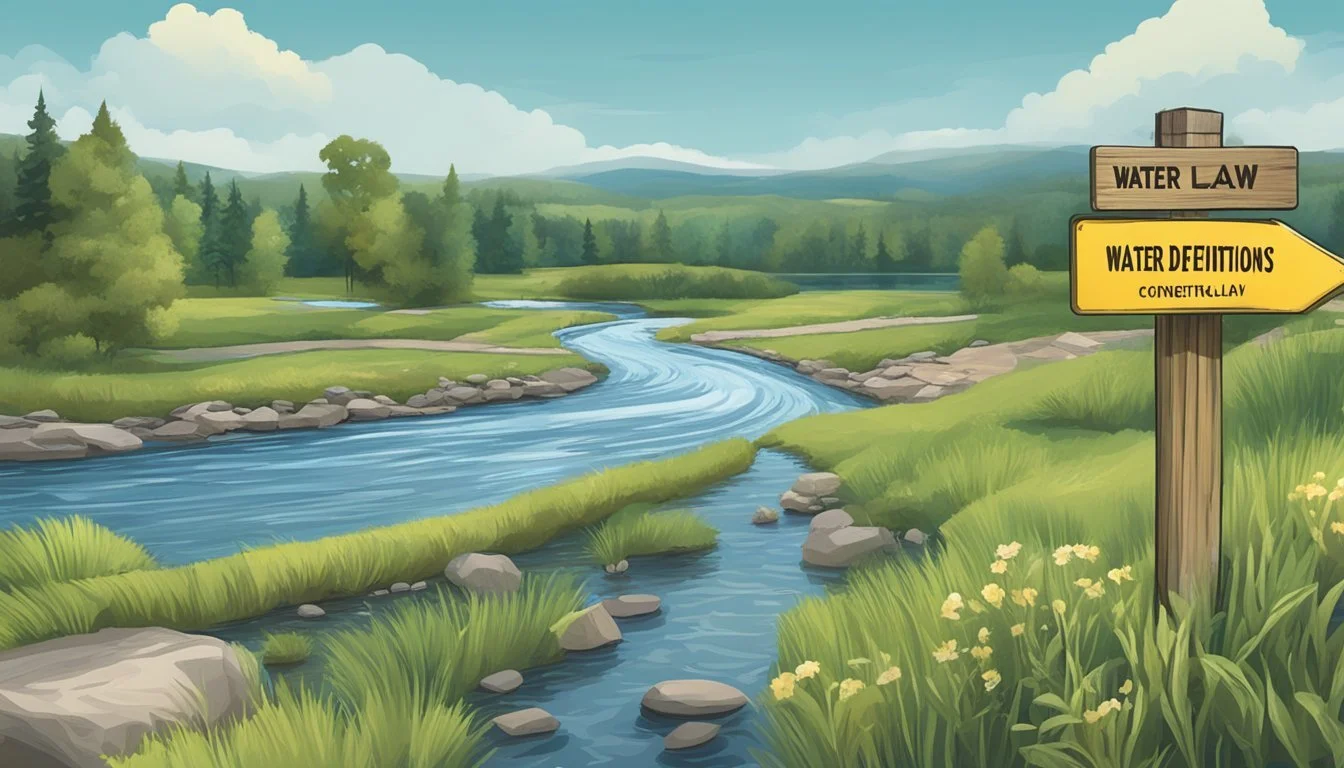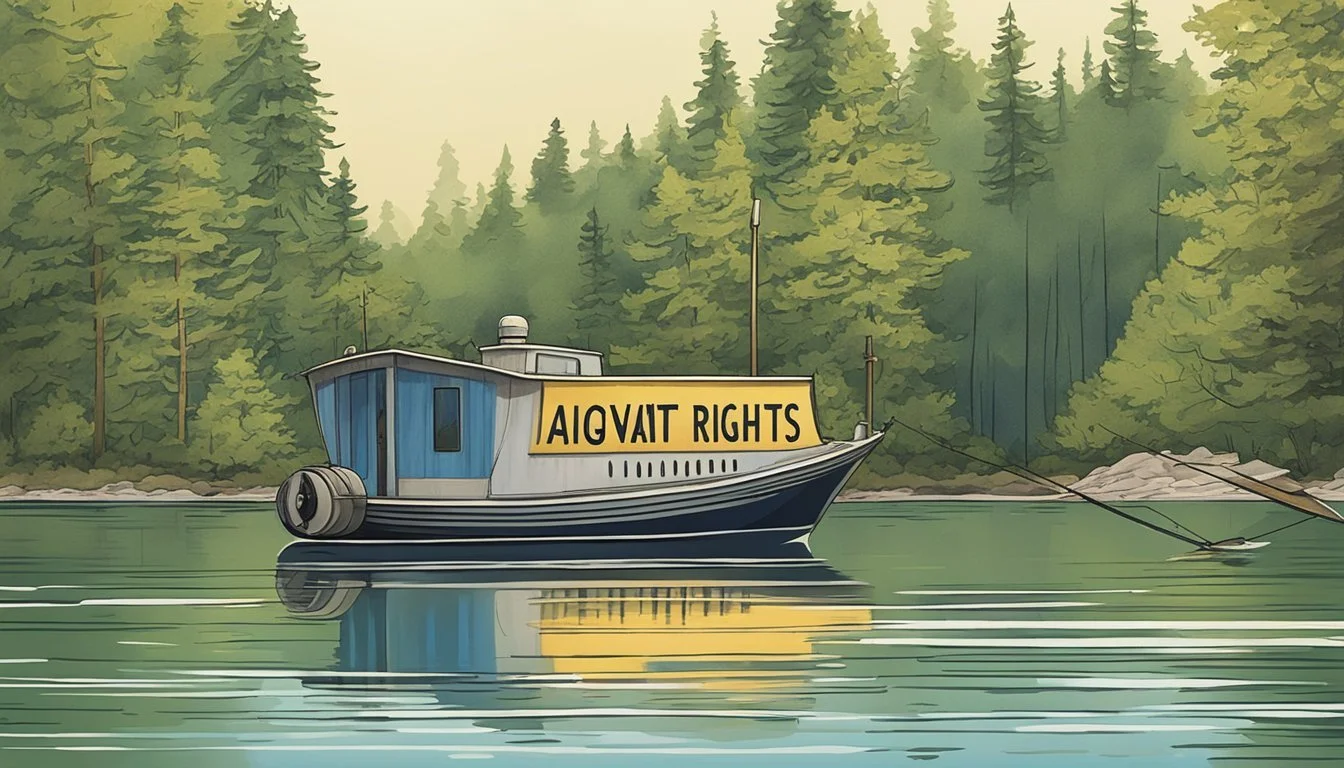Water Rights in Michigan
Understanding Legal and Environmental Implications
Water rights in Michigan encompass the legal framework that governs the use and management of water resources within the state. These rights are particularly significant given Michigan's rich endowment of freshwater resources, including the Great Lakes, which collectively hold one-fifth of the world's surface fresh water. State water law operates under the riparian doctrine, granting individuals with property abutting a water body the right to reasonable use of the water along their shoreline.
Understanding Michigan water law is essential for residents, especially those living near the abundant lakes and rivers. The legal rights and responsibilities of riparian property owners are defined by both state legislation and court rulings. These rights allow for the domestic use of water, including activities such as watering gardens and operating sprinkler systems. However, these uses must not interfere with the rights of other property owners or the public interest.
Conflicts over water rights in the state may arise in various contexts, from conservation efforts to property development. With the constant evolution of case law, staying informed about Michigan's riparian rights is crucial for those seeking to navigate the interface between private land ownership and public water use. The balance between individual property rights and the collective preservation of Michigan's water bodies underlies the importance of understanding and respecting this legal framework.
Historical Context
The evolution of water rights in Michigan is marked by a series of legal developments that have shaped how water is accessed and managed. This history reflects the state's approach to balancing individual property rights with the public's interest in this vital resource.
Development of Michigan Water Law
Michigan's water law has its roots in the English common law tradition, particularly the riparian doctrine, which grants those owning land bordering a watercourse the right to make reasonable use of it. In 1936, federal appeals affirmed the legal principle established by the Michigan Supreme Court that remains vital today, ensuring recreational use of Michigan's waterways for future generations (Public Access to Public Water).
Michigan's approach to water rights has often involved court judgments, where issues such as water security and conflicts over water use have periodically risen to prominence. Courts have upheld the reasonable use doctrine, striking a balance between the needs of landowners and the rights of the public.
Public Act 56 and Its Implications
In 2013, Michigan enacted Public Act 56, addressing the encroachment of private structures on public lands. This law has significant implications for the rights of individuals to place structures on the bottomlands of the Great Lakes and other waterways. The act is a contemporary reflection of the ongoing dialogue between private interests and the preservation of public rights in Michigan (Michigan Water Law and Public Act 56).
These legal frameworks reflect how Michigan's water laws have evolved to adapt to changing societal needs and environmental challenges, all while maintaining an emphasis on the public's right to access and use state waters.
Fundamentals of Water Rights
Water rights in Michigan are governed by a set of laws and principles that recognize the significance of water resources to property owners and the environment. These laws establish how water can be accessed, used, and managed.
Riparian Rights Explained
In Michigan, Riparian Rights are a key element of water law that pertain to landowners whose property is adjacent to a natural watercourse, such as a lake, river, or stream. Riparian property owners have the right to make reasonable use of the water, which includes domestic uses and recreational activities. However, their use must not adversely affect the rights of other riparian owners or harm the ecosystem. Additionally, they may have some rights to alter the shoreline, but typically this is limited to ensure the protection and natural state of the watercourse.
The Great Lakes Difference
When it comes to the Great Lakes, there is a unique aspect to water rights due to the vast nature and shared jurisdiction of these waters. Riparian Rights still apply; however, they are influenced by binational treaties, federal laws, and interstate compacts. The Great Lakes Basin is managed to balance the needs of riparian property owners with the interests of the public and environmental conservation. In Michigan, the use of Great Lakes water must comply with the principles laid out in the Great Lakes-St. Lawrence River Basin Water Resources Compact, which governs water withdrawal, diversion, and conservation practices to protect these extensive shared water resources.
Property Ownership and Water Access
Property ownership in Michigan often includes riparian rights, which grant access to water bodies such as lakes and streams. These rights have a significant impact on both the scope of property use and its market value.
Property Owners' Rights and Limitations
In Michigan, property owners of waterfront homes hold riparian rights, which entitle them to certain uses of adjacent water bodies. These rights typically include the ability to use the water for domestic purposes, dock boats, and enjoy the water frontage. However, property owners must also be aware of certain limitations; for instance, alterations to the shoreline may be restricted to protect the environment and public trust. Any changes, such as constructing structures or modifying the shoreline, generally require permits to ensure that environmental codes and local laws are not breached. Understanding these Water Access Laws is crucial for maintaining legal compliance and preserving the benefits associated with waterfront property.
Water Access and Property Value
Access to a body of water like an inland lake can significantly enhance the value of private property. Waterfront properties in Michigan command higher prices due to their desirable location and the recreational opportunities they offer. For property owners, maintaining riparian rights is often essential to maximize property value. This is not only due to the direct benefits of water access but also because of the broader appeal to future buyers who value the lifestyle that comes with living by water. Nevertheless, the specifics of the rights and any associated restrictions are important details to clarify, as they can influence the property's marketability and worth for a waterfront homeowner.
Regulating Use and Preservation
In Michigan, the management of water resources is a critical task that combines the enforcement of environmental protection laws and the regulation of water use through local ordinances and legislative measures. These efforts are essential for sustaining the state's water purity and availability for future generations.
Environmental Protection and Pollution Control
Michigan's environmental quality and water resources are guarded by stringent pollution control measures. Under Part 327 (Great Lakes Preservation) of the Natural Resources and Environmental Protection Act, the state administers procedures and standards particularly for groundwater uses to prevent any adverse effects that could compromise water quality.
The Safe Drinking Water Act 399 also plays an integral role, providing a framework to ensure that water supplied to the public meets health and safety standards. Moreover, Michigan's water well construction program establishes regulations that aim at mitigating the risks of groundwater contamination during well development and operation.
Zoning, Local Ordinances, and Legislation
Local governments in Michigan are empowered to enact zoning and ordinances that directly affect water use within their jurisdictions. These local measures address various aspects of water consumption and conservation, ensuring alignment with broader state legislation.
For instance, new water use regulations have come into force, aiming at managing the state's large water withdrawals. These regulations are backed by scientific research and include a water withdrawal assessment process for high-capacity wells, ensuring sustainable water use that does not imperil local water resources. A series of bills connected to this regulatory framework have received legislative support and have been implemented to guide responsible water management practices throughout Michigan.
Waterfront Structures and Activities
Waterfront ownership in Michigan provides various privileges, but it also requires adherence to specific regulations to ensure the responsible use and enjoyment of the state's water resources.
Docks and Boat Hoists Regulations
Individuals owning waterfront property in Michigan have the right to install docks and boat hoists. However, they typically require a permit from the appropriate regulatory body. The installation must not interfere with the natural flow of water, disrupt aquatic ecosystems, or impede public access to navigable waters. For instance, placing a dock or hoist requires consideration of:
Setback requirements: Ensuring a minimum distance is maintained from neighboring properties.
Environmental impact: Protecting the surrounding aquatic habitat.
Permits and precise regulations can be found with resources like the Michigan Lakes & Streams Association, INC, which outlines the necessary steps for lawful installation and maintenance of these structures.
Recreational Activities and Restrictions
The rights to engage in boating, fishing, and swimming are enjoyed by many Michigan waterfront property owners. Every activity must align with local laws to maintain the delicate balance between recreation and conservation:
Boating: Subject to restrictions based on boat size and engine capacity to minimize erosion and protect wildlife. Personal watercraft operation may also be limited to certain times of the day.
Fishing: Allowed with appropriate licensing and adherence to state regulations concerning seasons, catch limits, and size restrictions. This ensures sustainable practices and the long-term health of fish populations.
Swimming: Permitted within the boundaries of one's property; however, safety regulations must be followed, including the provision of life-saving equipment and supervision where necessary.
Riparian property owners must familiarize themselves with these limitations to responsibly enjoy their waterfront activities. Information on specific activities and the regulations that govern them can typically be found through the Understanding Water Access Laws in Michigan.
Resolving Water-Related Legal Disputes
In Michigan, water-related legal disputes are frequently navigated through litigation and court rulings, which include the decisions of the Michigan Courts and Supreme Court. These processes ensure that riparian rights and access laws are enforced or interpreted as needed.
Riparian Rights Attorney and Litigation
When property owners face conflicts over water access or usage, they often seek the expertise of attorneys specializing in riparian rights. These legal professionals are adept in navigating the complexities of state water law and can guide clients through both settlement negotiations and courtroom litigation. Litigation may become necessary if disputes cannot be resolved through alternative methods, addressing issues such as reasonable use of water, shoreline alteration, and waterway access.
Court Rulings by Michigan Courts and Supreme Court
Michigan's legal framework for water rights includes the evolving body of court rulings. Decisions reached by the Michigan Supreme Court and Court of Appeals are critical in defining the scope and application of riparian rights—shaping future legal interpretations and setting precedents for similar disputes. These courts have a considerable influence on both the principles of water law and the outcomes of individual cases, ensuring that disputes are resolved in accordance with state laws and legal precedents.
Water Law Concepts and Definitions
In Michigan, water law is rooted in a blend of statutory law and common law principles that define usage rights and responsibilities. Two pivotal elements in this framework are easements and accretions, as well as the concept of the ordinary high water mark, which intersects with the public trust doctrine.
Understanding Easements and Accretions
An Easement is a non-possessory right to use the land of another for a specific purpose. In the case of water law, this often relates to the right to access and use water or waterfront. Accretions refer to the gradual and natural deposit of land, typically soil or sediment, created by the movement of water which can legally alter property lines. Property owners by water bodies may gain or lose land through this process, and it may affect where easements can be legally claimed.
Ordinary High Water Mark and Public Trust
The Ordinary High Water Mark (OHWM) is an important term in delineating the boundary between public and private land along water bodies. It is recognized as the highest point on the bank or shore where the presence and action of water is so continuous that it leaves a distinct mark, such as by causing erosion, destroying terrestrial vegetation, or creating a clear line impressed on the bank. The Public Trust Doctrine asserts that the state holds titles to the waters up to the OHWM in trust for the public, ensuring public rights for activities like fishing, boating, and navigation.
Responsible Stewardship and Public Access
Responsible stewardship in Michigan involves balancing the rights of property owners with public access to the state's waterways. This is integral to maintaining the delicate relationship between private rights and communal benefits.
Public Road Ends and Access to Waterways
Public road ends in Michigan provide critical points of entry to waterways. It has been established by legal precedent that a public road terminating at a navigable body of water may, in most instances, be used by the general public to gain access to the water's surface. Once legally on the water, they are free to navigate the expanse under the principles established by Michigan law. The rights afforded at these junctures are a manifestation of the public trust doctrine, which grants the general public access to these resources for recreational activities like boating and fishing.
Key aspects regarding road ends and access:
Legal Access: Presumption of public use at road ends
Activities: Fishing, boating, and navigation allowed
Regulations: Subject to local ordinances
Correlative Rights and Municipal Responsibilities
The concept of correlative rights implies that public access must be harmonious with private riparian rights. Municipalities in Michigan have the responsibility to ensure that public enjoyment does not infringe upon the rights of riparian property owners. These responsibilities include providing infrastructure for responsible access and managing the environmental impact of public use.
Key responsibilities of municipalities:
Access Management: Ensuring safe, legal public use
Environmental Stewardship: Protecting water quality for all users
Navigation and Aquatic Rights
Michigan's water rights include navigation and aquatic rights on its waterways. Understanding these rights is essential for property owners and those who use Michigan's navigable waters.
Navigable Waters and Navigation Rights
In Michigan, the term navigable waters refers to lakes, rivers, and other water bodies that are capable of being used for public transportation or commercial activity. The public has the right to freely navigate these waters without interference. These navigation rights are inherent for activities such as boating and fishing, provided they do not infringe upon riparian owner rights. It is important to note that the scope of what is considered navigable can be legally complex and determined by a variety of factors, including waterway size, depth, and historical usage.
Private Docks and Moorings
Private docks and mooring areas are often constructed by riparian landowners to enhance access to waterways. However, this construction must comply with state laws and cannot impede public navigation rights. The ownership of the submerged land remains vested with the state, and the riparian owner has the privilege of wharfage, which includes:
The right to build and maintain a dock
Mooring vessels temporarily
Installing private docks or mooring structures typically requires permission or permits to ensure they do not obstruct navigation or negatively impact the environment. Moreover, the use of these private structures must be reasonable and cannot lead to the exclusion of the public from navigable waters.
Frequently Asked Questions
This section addresses common inquiries regarding the intricacies of water rights for property owners and the legal provisions for water use and shoreline management in Michigan.
How are riparian rights determined for property owners in Michigan?
In Michigan, riparian rights are integral to property ownership adjacent to water bodies. These rights are automatically assigned to landowners and include access to, and reasonable use of, the water for domestic purposes, as well as certain rights regarding the alteration of the shoreline.
What are the regulations for constructing docks and estimating riparian rights lines in Michigan?
The construction of docks and the estimation of riparian rights lines in Michigan are subject to state laws. These regulations ensure that docks do not interfere with the public's use of waterways or with the riparian rights of neighboring property owners.
How does Michigan law address private lake ownership and usage?
Private lake ownership and usage are topics addressed by Michigan law through doctrines and statutes that govern private and public access, water rights, and property owner responsibilities. These laws specify the conditions under which a lake may be considered private and detail the rights of owners regarding the use of the lake.
What guidelines exist for shoreline management and development in Michigan?
Shoreline management and development in Michigan are subject to guidelines that aim to protect the ecosystem while balancing the interests of property owners. These guidelines stipulate acceptable practices for altering the shoreline to prevent environmental harm and maintain water quality.
Can homeowners with deeded lake access exercise the same rights as riparian property owners?
Homeowners with deeded lake access possess certain privileges, but these do not equate to the full spectrum of riparian rights held by adjacent property owners. The scope of their access is typically defined by the terms of the deed and may be limited compared to those with direct property contact with a water body.
What legal framework governs the ownership and use of flowing waters in Michigan?
The ownership and use of flowing waters in Michigan are governed by a legal framework that includes both common law principles and legislative enactments. This framework includes the doctrine of reasonable use, which protects the rights of landowners while ensuring the fair use and preservation of water resources.










